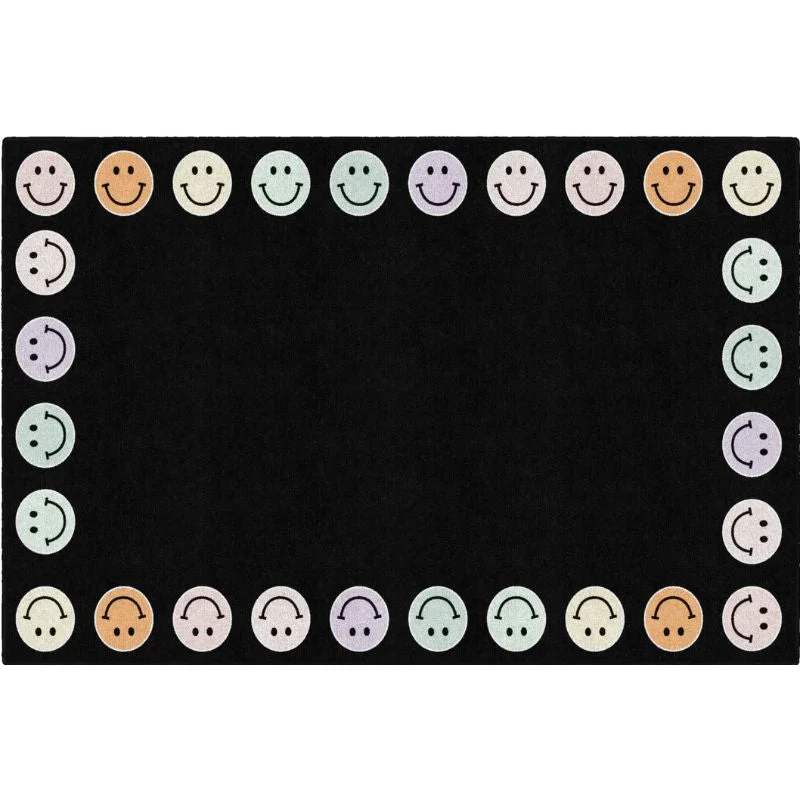Enhance your classroom with the Smiley Face Classroom Border Rug. Designed to infuse energy and positivity into any learning space, this rug is not only visually appealing but also incredibly functional. Designed to be educational.
Please Measure Your Space and Choose the Best Size
Sizes:

The bohemian-inspired pattern brings an eclectic touch to spaces of all sizes, while the rainbow hues add a playful element that captures attention and sparks creativity.
The colors and cheerful design will create a warm and inviting atmosphere that students will love. Whether used as a focal point for circle time activities, lesson plans or as a cozy spot for quiet reading sessions, this rug is sure to become a favorite among both teachers and students alike.
The Smiley Face Classroom Border Rug is made from quality materials that can withstand the rigors of daily use. Its sturdy construction ensures longevity, making it a smart investment for any classroom setting.
Students will be drawn to the cheerful faces, creating opportunities for discussions about emotions, friendship, and kindness.
- Made in the USA
- Treated with Scotchgard protector for superior soil resistance.
- 24 oz Nylon w/Urethane Backing System
- Class I Flammability Rating and Indoor Air Quality passed.
- Bound and double stitched with nylon edge yarn for maximum strength and durability.
SensoryEdge is an Authorized Seller of SchoolGirl Style Designs
 Lesson Plan: Emotions and Colors with Smiley Faces Rug
Lesson Plan: Emotions and Colors with Smiley Faces Rug
Grade Level: Kindergarten - 1st Grade
Subject: Social-Emotional Learning (SEL), Art, and Math
Duration: 45 minutes
Objectives:
- Students will understand the concept of patterns using colors.
- Students will engage in a collaborative activity that promotes social interaction and teamwork.
Materials Needed:
- Colorful markers or crayons
- Large chart paper
- Emotion flashcards
- Paper plates or circles cut from construction paper
- Glue sticks
- Whiteboard and markers
Lesson Plan:
Introduction (10 minutes):
-
Gather the students around the smiley face border rug.
-
Discussion: Ask the students to observe the rug and describe what they see.
-
Introduce Emotions: Show emotion flashcards (happy, sad, angry, surprised, etc.) and match them with the faces on the rug.
Activity 1: Emotion Exploration (15 minutes):
-
Emotion Matching Game:
- Divide the students into small groups.
- Give each group a set of emotion flashcards and ask them to match the flashcards with the corresponding smiley faces on the rug.
- Discuss each emotion with the class and ask students to demonstrate the emotions with their faces.
-
Emotion Drawing:
- Hand out paper plates or pre-cut circles to each student.
- Ask the students to draw different emotions on their plates using markers or crayons.
- Have the students share their drawings with the class and place them around the rug, creating a larger emotion border.
Activity 2: Color and Pattern Recognition (15 minutes):
-
Color Identification:
- Ask the students to identify and name the colors of the smiley faces on the rug.
- Discuss how the colors make them feel.
-
Pattern Activity:
- On a large chart paper, draw a simple pattern sequence using colors from the rug (e.g., orange, green, blue, purple).
- Have the students continue the pattern by drawing the next few circles in the sequence.
Conclusion and Reflection (5 minutes):
-
Group Discussion:
- Ask the students what they learned about emotions and colors.
- Discuss how recognizing emotions can help us understand our own feelings and the feelings of others.
-
Cleanup:
- Encourage students to help tidy up the area.
Extension Activity:
-
Emotion Stories:
- Ask students to create short stories or scenarios involving the different emotions they learned. This can be done through drawings or simple sentences, depending on their writing skills.
-
Pattern Hunt:
- Have students look for patterns in the classroom or at home and share their findings the next day.
Assessment:
-
Observation: Monitor students' participation and engagement during activities.
-
Emotion Drawings: Evaluate the students' ability to express different emotions through their drawings.
-
Pattern Activity: Assess students' understanding of color patterns based on their chart paper activity.
Lesson Plan: Emotions and Colors with Smiley Faces Rug

